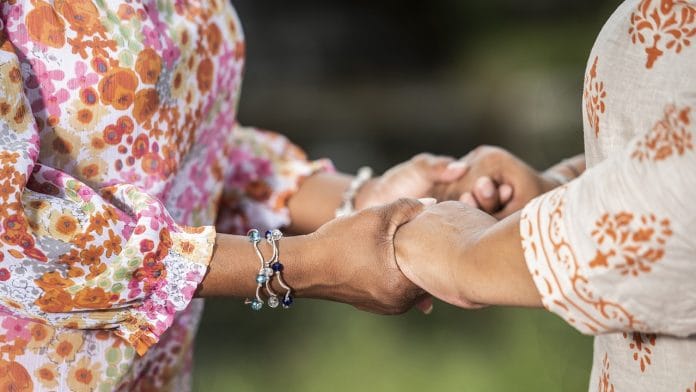Thank you dear subscribers, we are overwhelmed with your response.
Your Turn is a unique section from ThePrint featuring points of view from its subscribers. If you are a subscriber, have a point of view, please send it to us. If not, do subscribe here: https://englishdev.theprint.in/subscribe/
Out beyond ideas of wrongdoing and rightdoing there is a field. I’ll meet you there. Rumi
Rumi’s poetry captures the unconditional love that a great deal of us yearn for, however not many experience it. In this reflection, I draw upon two recent Indian movies to explore how healed feminine energy looks in individuals and what it does to our intimate relationship.
Understanding the balance of self-care is essential for nurturing healthy relationships. It allows individuals to express their needs and boundaries effectively, fostering emotional intelligence and mutual respect.
Feminine energy is expressed as nurturing, fluid, artistic, intuitive, empathetic, sensitive, compassionate, and gentle. When it is in dearth, one can be emotionally unavailable, have creative blockages, experience rigidity, lack of self-expression and trouble adjusting to change. However, with excessive feminine energy one can feel responsible for others’ well-being, giving too much, being overly forgiving, and having no boundary. All this can lead to codependency, victimhood, and lack of emotional intelligence.
First is the Hindi movie “Three of us,” that portrays Shefali’s character, diagnosed with early stages of dementia, who wants to visit her childhood hometown. Shefali’s husband (played by Swanand) accompanies his wife as she is reminiscing her childhood memories and most importantly reconnects with her childhood love interest portrayed by Jaideep. At no point her husband is jealous, nervous, or dominating, rather he accompanies her when she meets Jaideep and gives them space for alone time when needed. Although at one point you do feel his anguish as he questions whether she was ever this happy in their marriage. But he chooses to express his emotions openly and not resort to controlling or playing victim. Another example of healthy and healed feminine energy is shown in Jaideep and his wife’s characters. Jaideep asks his wife’s (played by Kadambari) permission before spending time with Shefali, and his wife openly states her demands of full disclosure and (playfully) asks for a bribe in return. Both were honest, self-expressive and adjusting to their current scenario. Further when Shefali’s character asks Kadambari if she was concerned about her sudden visit, Kadambari replies with utmost emotional maturity, acknowledging Shefali’s immense need to meet Jaideep. None of the women were jealous, insecure or played victim; also they did not portray the overly forgiving women of yesteryears. All characters in this movie displayed emotional maturity, honesty, and vulnerability. In their communication with their partners, they expressed and heard with respect and compassion. Although my personal favorite was Jaideep’s character embroidering a shawl for his wife and Swanand’s character giving an oil massage to his wife. When men embody their healed feminine, they are nurturing, caring, creative, and gentle. While women with healed feminine energy take responsibility for their personal well-being, ask what they want, and do not engage in pleasing or appeasing their partners. Women do not compensate for their husbands’ emotions, instead treat them as emotionally mature who can speak up for themselves.
Similarly, Kaathal, a Malayalam movie is grabbing attention for Mammootty’s portrayal of a middle-aged gay man stuck in a marriage in a village. This movie will be remembered for several reasons, but I like to highlight how it captures the healing of feminine energies within the couple as they struggle to embrace their changing relationship, i.e. divorce. Jyothika’s character as a wife married to a gay man had suffered years of pain, denial, and loss. She had resentments but with her decision to seek divorce, she was engaging in self-expression, drawing a boundary, and claiming her power. By doing so, she not only shows up for herself, but she does not abandon herself anymore. This beautifully captures that what hurts us the most is not when others abandon us but when we abandon ourselves. And we abandon ourselves when we do not listen to our inner self. The couple moves through the healing process as they are fighting the divorce case, but they continue living in the same house, eating together, and taking care of each other’s needs. One does wonder how the couple is not hostile or playing victim, instead there is shared pain, respect, and compassion for another. Both characters felt and expressed pain and love in their own way, without any justifications. Once again, the honesty, openness and authenticity of the male and female characters was deeply felt. They were authentic in their painful predicament. Nonetheless, you could sense the love and loss between them as Mammootty accompanies Jyothika (now his ex-wife) to meet a man. Just as Mammootty gets up to leave, you see how Jyothika reaches out for him while he struggles to walk out without looking back. Both are aware of the loss that is deeply rooted in unconditional love, beyond expectations. The love that we feel in Rumi’s poetry.
These pieces are being published as they have been received – they have not been edited/fact-checked by ThePrint.


